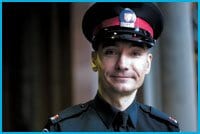Toronto police are launching a campaign to persuade youth to report homophobic violence.
The campaign, spearheaded by Const Tom Decker — the force’s queer liaison officer — is being developed in partnership with a number of community groups and will be launched at Pride.
“That suicide of Shaquille Wisdom happened in Ajax which really drove the whole point home in terms of homophobic bullying in our schools,” says Decker, referring to the suicide of a 13-year-old queer youth in October of last year. “Once an assault takes place then it is a crime.
“Our best bet would be to start as young as possible if you want to achieve social change. We thought why not start in schools. It’s aimed at high-school students and youth. Thirteen to 25 would be a safe age range.”
Decker says the campaign will include posters and flyers in schools and in the queer community, and he hopes to be able to produce internet and television spots if the money can be found.
“All the quirks have not been ironed out yet,” he says. “I’m still trying to find sponsors for it. The posters will be in schools pending content approval by the school boards. It’ll probably be a bit easier to get approval from the Toronto district public school board.”
Decker approached a number of community organizations about getting involved in the campaign. He says that Egale Canada, 519 Community Centre, the LGBT Youth Line, Central Toronto Youth Services, the school board’s Triangle Program, the Metropolitan Community Church of Toronto and Pride all agreed to participate in the campaign.
Decker also approached George Brown College about having its design students come up with the campaign materials. The college’s studio lab — which brings together design students from advertising, corporate and communications programs — usually does paid campaigns but agreed to work for free. The police service is providing a $500 bursary to the five students working on the campaign.
Jenny Lemieux, one of the professors running the lab, says students were eager to participate.
“It’s so important and we’re talking about a target group that’s in their age range,” she says. “Things are so open at George Brown especially in the design department that the students can’t believe other students are being persecuted for their sexual orientation.”
The students met with members of the community groups to discuss the issues before beginning the design work.
“The Toronto Police Service invited the Youth Line to get involved,” says Jennifer Fodden, the Youth Line’s executive director, “to provide perspective from the youth who call us about what the impact of homophobia, bullying and hate crimes can be.”
Fodden says the Youth Line is also involved in finding participants for focus sessions to be held on the preliminary poster designs.
“We have done some outreach on behalf of the campaign to gay-straight alliances,” she says. “There’s a push to get more straight youth involved since they’re one of the targets of the campaign.”
Fodden says she is optimistic the campaign will send a message about the rights of queer youth and the law on assaults.
“It will be a strong message about the harm done by homo-phobic and transphobic assaults as well as a reminder of the criminality of the acts,” she says. “It might also be a call for action for bystanders.”
Fodden says that knowing they have access to legal protection is a positive step for queer youth.
“I strongly believe that whether a person actually reports it to the police it’s empowering for them to know they have that right.”
Decker says that within the police force there is participation from the Hate Crimes Unit and from Crime Stoppers, which allows crimes to be reported anonymously. He says there is an educational process taking place within the force itself.
“If it can be determined that the assailant committed the attack because of a person’s race or sexual orientation or perceived sexual orientation it’s a hate crime,” he says. “We’re alerting our officers that if there is any indication that this could be a hate crime then this information should be passed along to the Hate Crimes Unit.”
Decker says that if the campaign meets with a positive response he would think about mounting a similar campaign aimed at adults.
“If the community thinks what we’re doing is a success and our community partners think so then by all means, why not?” he says. “It would be an exciting thing.”


 Why you can trust Xtra
Why you can trust Xtra


